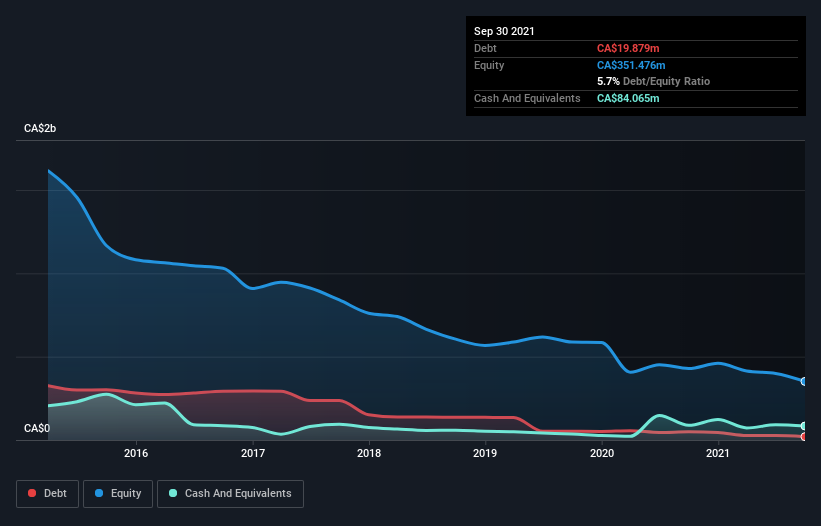Some say volatility, rather than debt, is the best way to think about risk as an investor, but Warren Buffett famously said that 'Volatility is far from synonymous with risk.' So it seems the smart money knows that debt - which is usually involved in bankruptcies - is a very important factor, when you assess how risky a company is. We can see that Dundee Corporation (TSE:DC.A) does use debt in its business. But is this debt a concern to shareholders?
When Is Debt Dangerous?
Debt is a tool to help businesses grow, but if a business is incapable of paying off its lenders, then it exists at their mercy. Part and parcel of capitalism is the process of 'creative destruction' where failed businesses are mercilessly liquidated by their bankers. While that is not too common, we often do see indebted companies permanently diluting shareholders because lenders force them to raise capital at a distressed price. Of course, the upside of debt is that it often represents cheap capital, especially when it replaces dilution in a company with the ability to reinvest at high rates of return. When we think about a company's use of debt, we first look at cash and debt together.
See our latest analysis for Dundee
How Much Debt Does Dundee Carry?
As you can see below, Dundee had CA$19.9m of debt at September 2021, down from CA$48.8m a year prior. But on the other hand it also has CA$84.1m in cash, leading to a CA$64.2m net cash position.

A Look At Dundee's Liabilities
The latest balance sheet data shows that Dundee had liabilities of CA$35.4m due within a year, and liabilities of CA$23.3m falling due after that. Offsetting this, it had CA$84.1m in cash and CA$15.0m in receivables that were due within 12 months. So it actually has CA$40.4m more liquid assets than total liabilities.
This excess liquidity suggests that Dundee is taking a careful approach to debt. Due to its strong net asset position, it is not likely to face issues with its lenders. Simply put, the fact that Dundee has more cash than debt is arguably a good indication that it can manage its debt safely. The balance sheet is clearly the area to focus on when you are analysing debt. But you can't view debt in total isolation; since Dundee will need earnings to service that debt. So when considering debt, it's definitely worth looking at the earnings trend. Click here for an interactive snapshot.
In the last year Dundee wasn't profitable at an EBIT level, but managed to grow its revenue by 77%, to CA$35m. With any luck the company will be able to grow its way to profitability.
So How Risky Is Dundee?
By their very nature companies that are losing money are more risky than those with a long history of profitability. And we do note that Dundee had an earnings before interest and tax (EBIT) loss, over the last year. Indeed, in that time it burnt through CA$8.2m of cash and made a loss of CA$47m. With only CA$64.2m on the balance sheet, it would appear that its going to need to raise capital again soon. With very solid revenue growth in the last year, Dundee may be on a path to profitability. By investing before those profits, shareholders take on more risk in the hope of bigger rewards. For riskier companies like Dundee I always like to keep an eye on whether insiders are buying or selling. So click here if you want to find out for yourself.
Of course, if you're the type of investor who prefers buying stocks without the burden of debt, then don't hesitate to discover our exclusive list of net cash growth stocks, today.
New: Manage All Your Stock Portfolios in One Place
We've created the ultimate portfolio companion for stock investors, and it's free.
• Connect an unlimited number of Portfolios and see your total in one currency
• Be alerted to new Warning Signs or Risks via email or mobile
• Track the Fair Value of your stocks
Have feedback on this article? Concerned about the content? Get in touch with us directly. Alternatively, email editorial-team (at) simplywallst.com.
This article by Simply Wall St is general in nature. We provide commentary based on historical data and analyst forecasts only using an unbiased methodology and our articles are not intended to be financial advice. It does not constitute a recommendation to buy or sell any stock, and does not take account of your objectives, or your financial situation. We aim to bring you long-term focused analysis driven by fundamental data. Note that our analysis may not factor in the latest price-sensitive company announcements or qualitative material. Simply Wall St has no position in any stocks mentioned.
About TSX:DC.A
Excellent balance sheet with proven track record.
Similar Companies
Market Insights
Community Narratives



